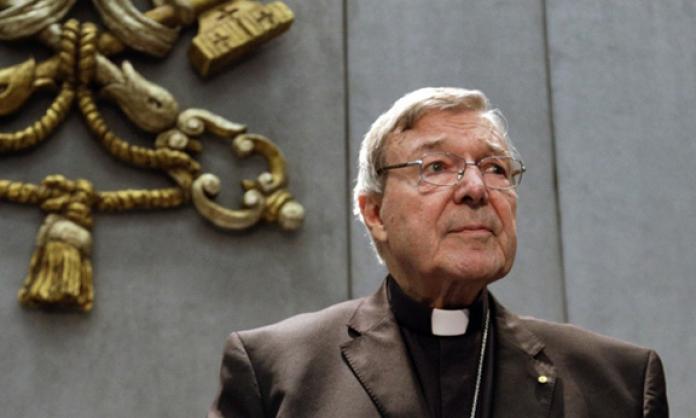“A fine human being … One of the greatest churchmen that Australia has seen.” That was Tony Abbott on the ABC’s Lateline in 2004 when asked his opinion of cardinal George Pell.
Abbott has not been Pell’s only conservative defender. Every part of the right wing establishment has at one time or another gone in to bat for Australia’s leading Catholic representative. Such support from the heart of the establishment explains Pell’s rapid rise to the third most senior position in the Roman Catholic world.
It’s no secret why the Liberal Party has been so fond of him. If the Church of England was once described as the British Conservative party at prayer, George Pell has been the unofficial spiritual representative of the Australian Liberals.
Pell has been a steadfast supporter of virtually every socially reactionary cause. In response to reports of boys in Catholic schools driven to suicide by homophobia, he said, “Homosexuality is a much greater health hazard than smoking”. He told delegates to the World Youth Day in 2002 that “abortion is a worse moral scandal than priests sexually abusing young people”, and he is adamantly opposed to contraception and to sex outside marriage. He has denounced concern about climate change as “a symptom of pagan emptiness” and the Greens as “anti-Christian”.
Views such as these cemented Pell’s position as a right wing warrior and won him favour among conservative politicians. He was regularly consulted by the likes of Tony Abbott and reciprocated in kind, telling a Fairfax journalist in 2012 that the two of them have been friends for years: “I admire him as a very decent and competent fellow”.
Pell’s close relations with right wing politicians have been accompanied by a torrent of government money into the coffers of the Catholic hierarchy. The church is as much a business as a religious institution. It is the country’s largest private property owner and the biggest non-government employer, and it enjoys annual tax-free revenues of tens of billions of dollars.
Befitting his station in life, Pell lives not among the poor but in a $30 million mansion in Rome, paid for by the Sydney diocese.
Rupert Murdoch could spot a soul similar to his own in George Pell. The archbishop was given a regular column in the Sunday Telegraph to expound his extremely right wing world view. In 2014, when Pell was promoted to a senior position in the Vatican, at least partly to extricate him from investigations into abuse that were coming ever closer, Murdoch described him as “brilliant”. According to Murdoch, “Australia will miss him but the world will benefit”.
Pell’s reactionary politics and his reputation for kicking heads also drew him to the attention of one of the most reactionary popes of the 20th century, Pope John Paul II, who appointed him archbishop of Melbourne from 1996 to 2001 and Archbishop of Sydney from 2001 to 2014, alongside a steady elevation within the Vatican hierarchy, culminating in his appointment by Pope Francis in 2014 to a full time position in the Council of Cardinals.
Child abuse
Pell and his defenders try to portray the cardinal as a pioneer in tackling sexual abuse within the church. They point to the fact that in 1996 he established one of the first committees to look into sexual abuse, in the form of the Melbourne Response.
The historical record shows how false this claim is. There was his early career in Ballarat, possibly the centre of the entire child abuse scandal in Victoria in the 1970s and the home of the most notorious child abuser, Gerald Ridsdale. As journalist David Marr relates:
“He sat on a committee that transferred father Gerald Ridsdale from parish to parish. The crimes of this vicious paedophile were notorious in Ballarat, known to the bishop and familiar to other members of the committee. But, by his own account, Pell never asked why this priest was always on the move.”
When Ridsdale was finally charged and appeared before the court in 1994, Pell walked into court with him and refused to do the same for any of Ridsdale’s victims. Many years later, at the royal commission hearing in 2016, Pell scandalised even some of his strongest supporters, explaining that Ridsdale’s crimes were “a sad story but of not much interest to me”.
The Melbourne Response was established not to shine a light into the dark corners of the church’s history but to minimise damage to it. Marr writes: “It saved the church hundreds of millions of dollars, giving small sums to the victims and most of the time compelling them to remain quiet about their fates and their settlements”.
Eventually, the abuse scandals, both in Australia and abroad, could no longer be swept under the rug. First, an inquiry in Victoria and then a royal commission were convened despite the best efforts of Pell and his allies to prevent them. Pell held them both in utter contempt, most famously refusing to appear when called to the second round of public hearings of the commission in 2016.
Forced by the sheer weight of evidence brought to the commission – including 4,000 cases of people claiming sexual abuse – Pell apologised on behalf of the church. But the church still had its defenders in high places. In May 2013, the NSW state government passed the Victims’ Rights and Support Act, which limited compensation to a mere $15,000 and imposed a time limit for those claiming compensation of just 10 years from the alleged act.
Charges
Pell’s entire career, then, has been one in which he has been promoted by very powerful people who regard him as a champion of their causes. He in turn has done his best to cover up a record of sustained child abuse within the church and, if the charges now laid against him are proven, a lot more than that.
The same people who have promoted Pell are now yelling the house down in protest at the fact that he has been called to face the charges against him at the Melbourne Magistrates Court in July.
Some of his supporters say that the charges are just based on lies – the same defence that kept hundreds of abusive priests out of court for decades. The archbishop of Hobart sprang to Pell’s defence, saying that he did not believe the charges “have got any substance to them”.
Others in Pell’s corner seem to regard the very idea of charges against someone like him as an absolute affront. For Andrew Bolt, the charges are “a tragedy” and “the ultimate insult to a man who has endured so many already … How Pell keeps going astonishes me”. Former prime minister John Howard reckons that the cardinal is the victim of a “get Pell” mentality.
Many defenders of the cardinal cannot say enough words in his praise. His Sydney successor and acolyte, archbishop Anthony Fisher, describes him as “a man of integrity, a man of faith and high ideas, a thoroughly decent man”. As if many “decent men” have not in numerous recent legal cases been found to be depraved sadists.
But perhaps the most popular narrative coming from the right wing media, covering everyone from Miranda Devine to Gerard Henderson, is that Pell and the Catholic hierarchy are being subjected to a vicious witch-hunt by the Victorian police, the Andrews government and a “baying pack of journalists” from the Fairfax press.
Like the fearless champions of liberty and due process that they are, the right demand that Pell be entitled to the presumption of innocence and a fair trial. Some, like the Australian’s Paul Kelly, even seem to think that, given the “unprecedented and manic campaign”, it’s the justice system that is on trial as much as Pell, while Henderson reckons, “[I]f you’re a conservative Christian, don’t expect the benefit of due process”.
Any notion that Pell will not be afforded the best legal defence money can buy and scrupulous observation of every legal nicety is absurd. Men like Pell rarely find themselves in the dock, and when they do they invariably find themselves treated as a whole class or two above the riffraff who normally come to the attention of state prosecutors.
There’s irony in their demand for a fair trial for Pell when that is the exact thing that thousands of abuse victims have been demanding for those who have abused them: an above board trial, where their tormentors can be cross-examined and they have a chance to put their testimony. Instead, the victims have been abused, ridiculed, threatened, belittled and humiliated and, at best, fobbed off with a few pennies of shut-up money.
And the right wing chorus demanding presumption of innocence is very admirable until you recall their own vehement hostility to it when it comes to those not clad in scarlet capes. Muslim men banged up on terrorism charges? No fair trial for them. African young men gathered in the streets of Melbourne? Violent gang members who need to be rounded up and hauled off to jail.
Aboriginal kids held on remand in juvenile detention centres? Hoodlums and habitual miscreants. Trade unionists on a picket line? Guilty of thuggery.
he justice system is on trial in the case of George Pell? No, the justice system has failed each and every one of these without so much as a peep of protest from our would-be guardians of legal process and the presumption of innocence. When these people speak of “character assassination” and “witch-hunts”, they should look in the mirror to find those responsible.









